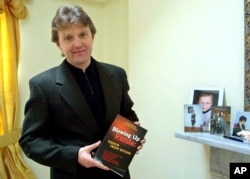With relations between Russia and the West spiraling to new lows over Ukraine, bilateral ties between London and Moscow themselves are becoming more strained as the inquest into the murder of a former Russian spy gets underway.
A judge this week began hearings into the death of Alexander Litvinenko, who died in 2006 after ingesting polonium-210, a highly radioactive isotope.
British investigators have accused two Russians of poisoning Litvinenko’s tea at a London restaurant. The two men, one of whom is now a member of Russia’s parliament, have repeatedly denied involvement. Moscow has refused British requests to extradite them, citing constitutional restrictions.
Litvinenko had fled to Britain in 2000 after making sensational accusations about terrorist bombings in Russia. On his deathbed, he accused Russian President Vladimir Putin of ordering his assassination.
Ben Emmerson, a lawyer for the Litvinenko family, told the panel earlier this week that Litvinenko’s death was an act of terrorism.
“It is and was an act of nuclear terrorism, on the streets of a major city, which put the lives of numerous other members of the public at risk,” he said.
“The startling truth which will be revealed by the evidence in this inquiry is that a significant part of Russian organized crime is organized directly from the offices of the Kremlin,” he said.
The British government originally rejected holding an inquiry, partly on the ground that it could damage relations with Russia. The inquiry will take evidence for eight weeks, and observers expect more damaging accusations to emerge against the Russian government.
Litvinenko’s widow, Marina, said Russia’s actions in Ukraine demonstrate Moscow’s willingness to order her husband’s murder.
Also this week, Royal Air Force fighter jets intercepted two Russian long-range bombers, known as Tu-95 “Bear” bombers, close to British airspace, prompting authorities to summon Moscow’s ambassador to complain.
Similar Russian flights have become more frequent, not only near Britain but also near American airspace and that of other NATO allies since the conflict erupted in Ukraine last year.
Elizabeth Quintana, an analyst with the Royal United Services Institute, said the Russian aircraft normally skirt Britain's far northern airspace. This time, the flight path was different, she said.
“They were right down on the south coast over the Channel between the UK and France. Also, they were flying without their transponders on … there was particular concern because that means they would have crossed very heavy trans-Atlantic traffic,” she said.
She said Moscow could have directed its bombers toward Britain in response to the Litvinenko inquiry.
Both the West and Russia, she said, “are probing each other’s defenses, testing how quickly they react, seeing if there are any weaknesses. And also signaling to each other, signaling discontent.”
